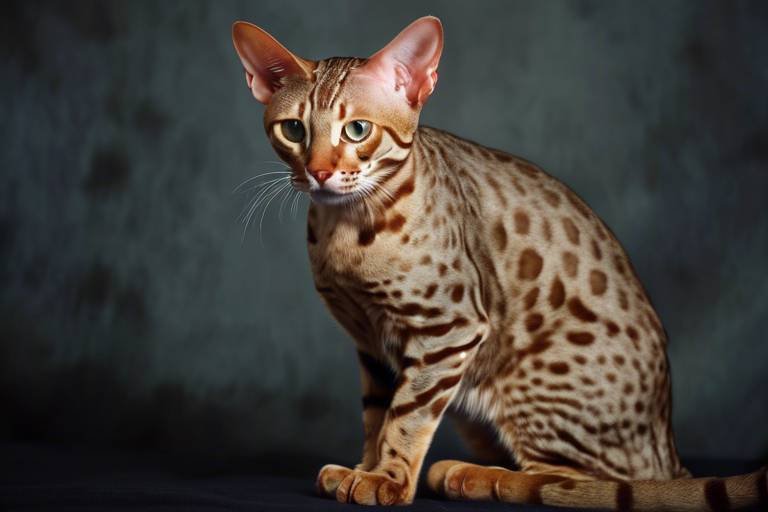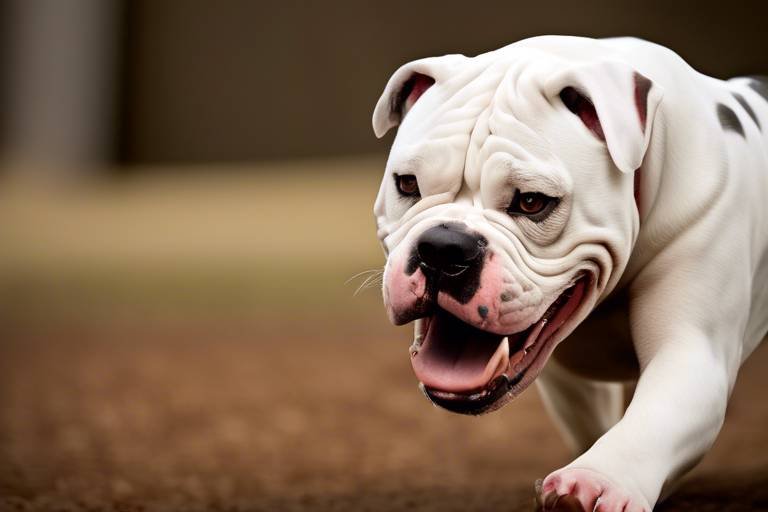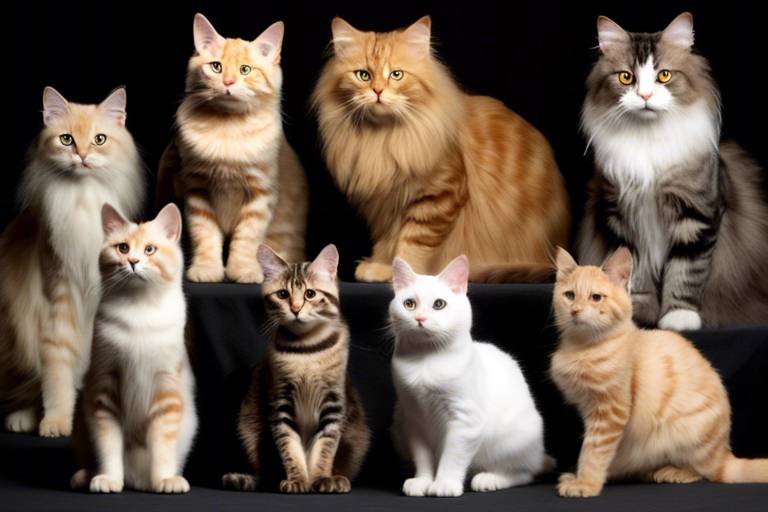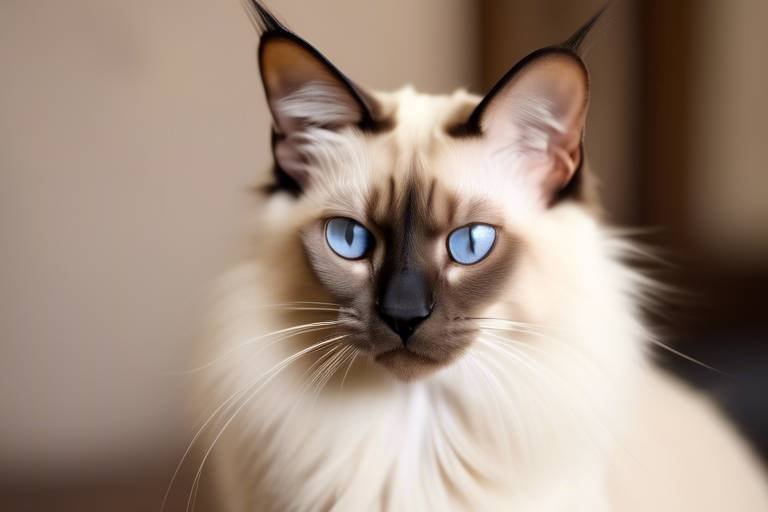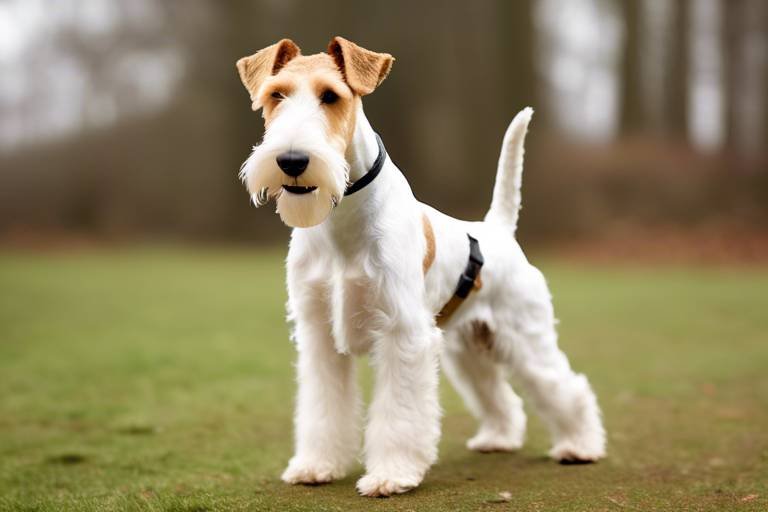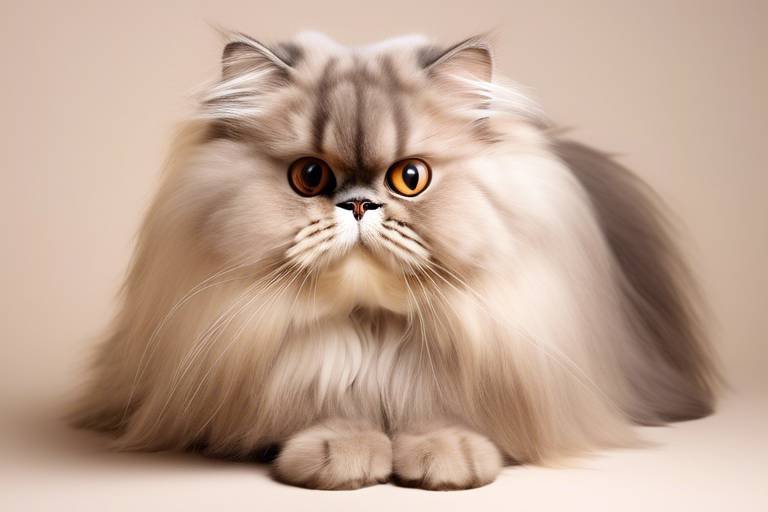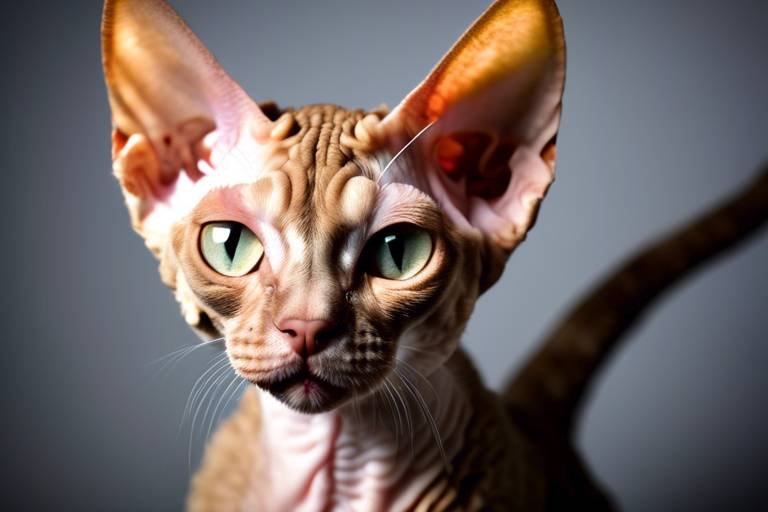The Unique Features of the Ocicat
The Ocicat is a breed that captivates the hearts of cat lovers around the world, and it’s not hard to see why. With its stunning resemblance to a wild leopard, the Ocicat brings a touch of the exotic into the realm of domestic cats. Imagine having a feline companion that looks like it just stepped out of a jungle, yet is as affectionate as a lap cat. This breed is not just about looks; it possesses a playful personality that makes it a joy to be around. If you’re considering adding an Ocicat to your family, you’re in for a treat! This article dives deep into the unique characteristics of the Ocicat, shedding light on its physical appearance, delightful temperament, health considerations, and grooming needs.
One of the most striking features of the Ocicat is its coat. The breed boasts a short, dense coat that can come in a variety of colors and patterns, including spotted, marbled, and ticked. These patterns mimic the wild look of a leopard, creating an illusion of a larger, more powerful cat. The Ocicat's muscular build and strong bones give it an athletic appearance, making it seem ready for adventure at any moment. The breed’s large, almond-shaped eyes add to its exotic allure, often sparkling with curiosity and mischief. When you see an Ocicat, it’s hard not to be drawn in by its beauty and grace.
Ocicats are more than just a pretty face; they are known for their friendly and outgoing nature. These cats thrive on social interactions, whether it’s with their human companions or other pets in the household. They are often described as being dog-like in their loyalty and affection, eagerly following their owners around the house and seeking out attention. If you’re looking for a cat that will actively engage with you, the Ocicat is an ideal choice. Their playful spirit ensures that there’s never a dull moment, as they love to chase toys, climb, and explore their surroundings.
One of the hallmarks of the Ocicat's personality is its playfulness. These cats are bundles of energy, always ready to engage in a game or explore new environments. They enjoy interactive toys that challenge their minds and keep them physically active. Think of an Ocicat as a little athlete, always on the move and ready for action. This playful demeanor not only keeps them entertained but also contributes to their overall health and well-being. Regular playtime is essential; it helps to strengthen the bond between the cat and its owner while providing necessary exercise.
Beyond their playful nature, Ocicats are incredibly intelligent. They possess a natural curiosity that drives them to explore and learn. This intelligence makes them highly trainable; many Ocicat owners report that their cats can learn tricks and commands, much like dogs. Imagine teaching your cat to fetch or even to walk on a leash! This breed thrives on mental stimulation, so providing puzzle toys or engaging in training sessions can be particularly beneficial. Their sharp minds combined with their playful spirits make them truly unique companions.
Ocicats are social butterflies, often seeking out human interaction and enjoying being involved in family activities. They are known to form strong bonds with their owners, displaying affection through head butts, purring, and cuddling. This breed is not one to shy away from attention; instead, they thrive on it. If you’re someone who enjoys having a pet that is not just a companion but also a friend, an Ocicat will fit right into your life. They are known to be quite vocal, often communicating their needs and desires with a variety of sounds.
Another wonderful aspect of the Ocicat is its compatibility with other pets. This breed tends to get along well with dogs and other cats, making it an excellent choice for multi-pet households. Their friendly disposition allows them to adapt easily to different environments and social settings. If you already have pets at home, introducing an Ocicat can lead to a harmonious household where all animals coexist peacefully. Just imagine the lively atmosphere of a home filled with playful cats and dogs, all engaging in their antics together!
While Ocicats are generally healthy, they are prone to certain genetic conditions. Regular veterinary check-ups and a balanced diet are essential to maintain their well-being and longevity. Being aware of potential health issues can help you take proactive measures to ensure a long and happy life for your feline friend. It’s important to keep an eye on their weight, as obesity can lead to various health problems.
Understanding the common health issues associated with Ocicats can help owners take proactive measures. Some of the conditions to monitor include:
- Hip Dysplasia
- Hypertrophic Cardiomyopathy (HCM)
- Dental Issues
Being informed about these conditions can empower you to seek veterinary advice early and maintain your Ocicat's health.
Routine veterinary visits, vaccinations, and a proper diet can significantly enhance the health of an Ocicat. Owners should prioritize preventive care to ensure their feline companions live long, healthy lives. Regular check-ups can help catch any potential issues before they become serious, allowing for timely treatment and care.
To keep their beautiful coats looking their best, Ocicats require regular grooming. Understanding their grooming needs can help owners maintain their cats' appearance while promoting skin health. Regular brushing not only helps reduce shedding but also gives you a chance to bond with your pet. A well-groomed Ocicat is not just a sight to behold; it’s also a happy, healthy cat.
Regular brushing helps reduce shedding and matting, ensuring the Ocicat's coat remains sleek and shiny. Using the right tools, like a soft-bristle brush or a grooming glove, can make grooming a pleasant experience for both cat and owner. Aim for a brushing session at least once a week, and don’t forget to reward your Ocicat with treats and affection afterward!
Occasional baths may be necessary to keep the Ocicat clean and free of allergens. Learning proper bathing techniques can help owners maintain their cat's hygiene without causing stress. Use a gentle cat shampoo and ensure that the water temperature is comfortable. Remember, a calm environment will make bath time much easier for both you and your feline friend.
1. Are Ocicats good with children?
Yes, Ocicats are known for their friendly and social nature, making them excellent companions for families with children.
2. How much exercise do Ocicats need?
Ocicats are energetic cats that require regular playtime to stay healthy and happy. Aim for at least 20-30 minutes of interactive play each day.
3. Do Ocicats shed a lot?
While they do shed, regular grooming can help manage this. Their short coat requires less maintenance than long-haired breeds.
4. Are Ocicats hypoallergenic?
No, Ocicats are not hypoallergenic, but some people with cat allergies may tolerate them better than others.
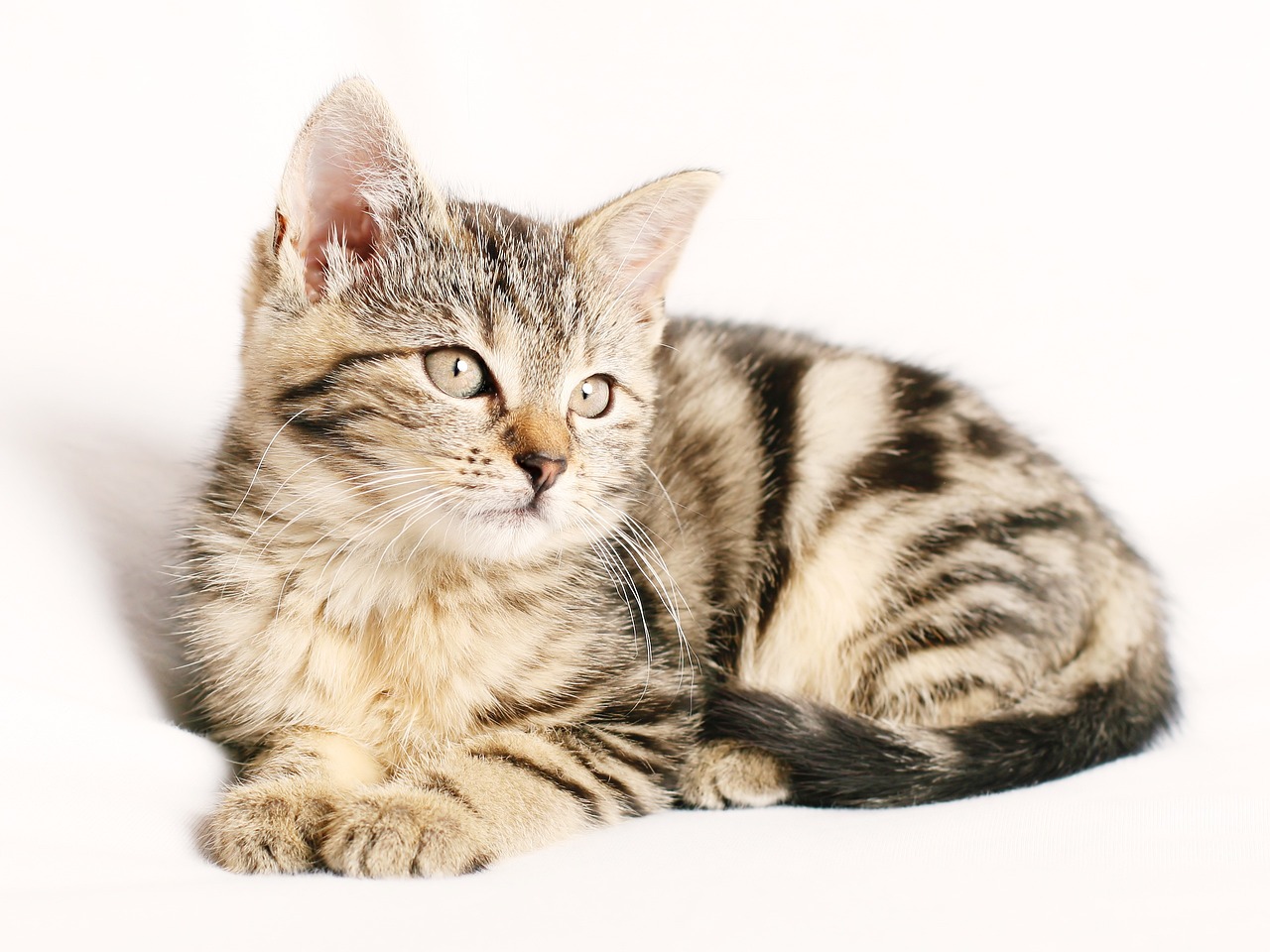
Physical Appearance
This article explores the distinctive characteristics of the Ocicat breed, including its striking appearance, playful personality, and unique history, providing insights for potential owners and cat enthusiasts alike.
The Ocicat is a remarkable breed that captures the eye with its wild appearance, often drawing comparisons to a small leopard. This captivating feline boasts a well-defined, muscular build, giving it a sense of strength and agility. One of the most striking features of the Ocicat is its coat, which is adorned with a variety of unique patterns that resemble those of wild cats. These patterns can include spots, stripes, and marbling, creating a visually stunning effect that sets the Ocicat apart from other domestic breeds.
In terms of coloration, Ocicats come in a variety of shades, including tawny, chocolate, cinnamon, and silver, among others. Each color variation adds to the breed's overall allure, making every Ocicat a unique masterpiece. The coat itself is short and sleek, which not only enhances its beauty but also contributes to the breed's low-maintenance grooming needs. Additionally, their large, almond-shaped eyes can be found in a range of colors, from gold to green, further accentuating their exotic appearance.
Let’s break down some of the key physical characteristics of the Ocicat:
| Characteristic | Description |
|---|---|
| Size | Medium to large, typically weighing between 8 to 15 pounds. |
| Coat | Short, dense, and glossy, with a variety of wild-like patterns. |
| Eyes | Large, almond-shaped, and can be gold, green, or copper. |
| Ears | Medium-sized, pointed, and slightly tufted at the tips. |
Beyond their physical attributes, Ocicats are also known for their graceful movements. They carry themselves with a sense of confidence and poise that is reminiscent of their wild ancestors. When they walk, it’s as if they are gliding, showcasing their strong legs and well-proportioned bodies. This combination of beauty and elegance makes the Ocicat a truly stunning addition to any home.
In conclusion, the Ocicat is not just another domestic breed; it’s a living work of art. Their striking appearance, combined with their playful and affectionate nature, makes them a popular choice for cat lovers seeking a unique companion. As you consider bringing an Ocicat into your life, remember that their beauty is matched only by their vibrant personality.
Ocicats are renowned for their friendly and outgoing nature. They are social cats that thrive on interaction with humans and other pets, making them excellent companions for families and individuals alike.
These cats are highly energetic and playful, often engaging in games and activities that stimulate their minds and bodies. Their playful demeanor helps keep them active and healthy throughout their lives.
Ocicats are intelligent and curious creatures. They enjoy problem-solving activities and can be trained to perform tricks, making them not only entertaining but also mentally stimulating companions.
Their sociable nature means that Ocicats often seek out human interaction and enjoy being part of family activities. They are known to bond closely with their owners and can be quite affectionate.
Ocicats tend to get along well with other pets, including dogs and other cats. Their friendly disposition allows them to adapt to multi-pet households, fostering a harmonious environment.
While generally healthy, Ocicats are prone to certain genetic conditions. Regular veterinary check-ups and a balanced diet are essential to maintain their well-being and longevity.
Understanding the common health issues associated with Ocicats can help owners take proactive measures. Conditions such as hip dysplasia and certain heart diseases are important to monitor.
Routine veterinary visits, vaccinations, and a proper diet can significantly enhance the health of an Ocicat. Owners should prioritize preventive care to ensure their feline companions live long, healthy lives.
Ocicats require regular grooming to maintain their beautiful coats. Understanding their grooming needs can help owners keep their cats looking and feeling their best while also promoting skin health.
Regular brushing helps reduce shedding and matting, ensuring the Ocicat's coat remains sleek and shiny. The right tools and techniques can make grooming a pleasant experience for both cat and owner.
Occasional baths may be necessary to keep the Ocicat clean and free of allergens. Learning proper bathing techniques can help owners maintain their cat's hygiene without causing stress.
- Are Ocicats hypoallergenic? No, Ocicats are not considered hypoallergenic, but they do have a low shedding coat.
- How much exercise do Ocicats need? They require daily playtime and mental stimulation to stay healthy and happy.
- Do Ocicats get along with children? Yes, they are usually very friendly and affectionate towards children.
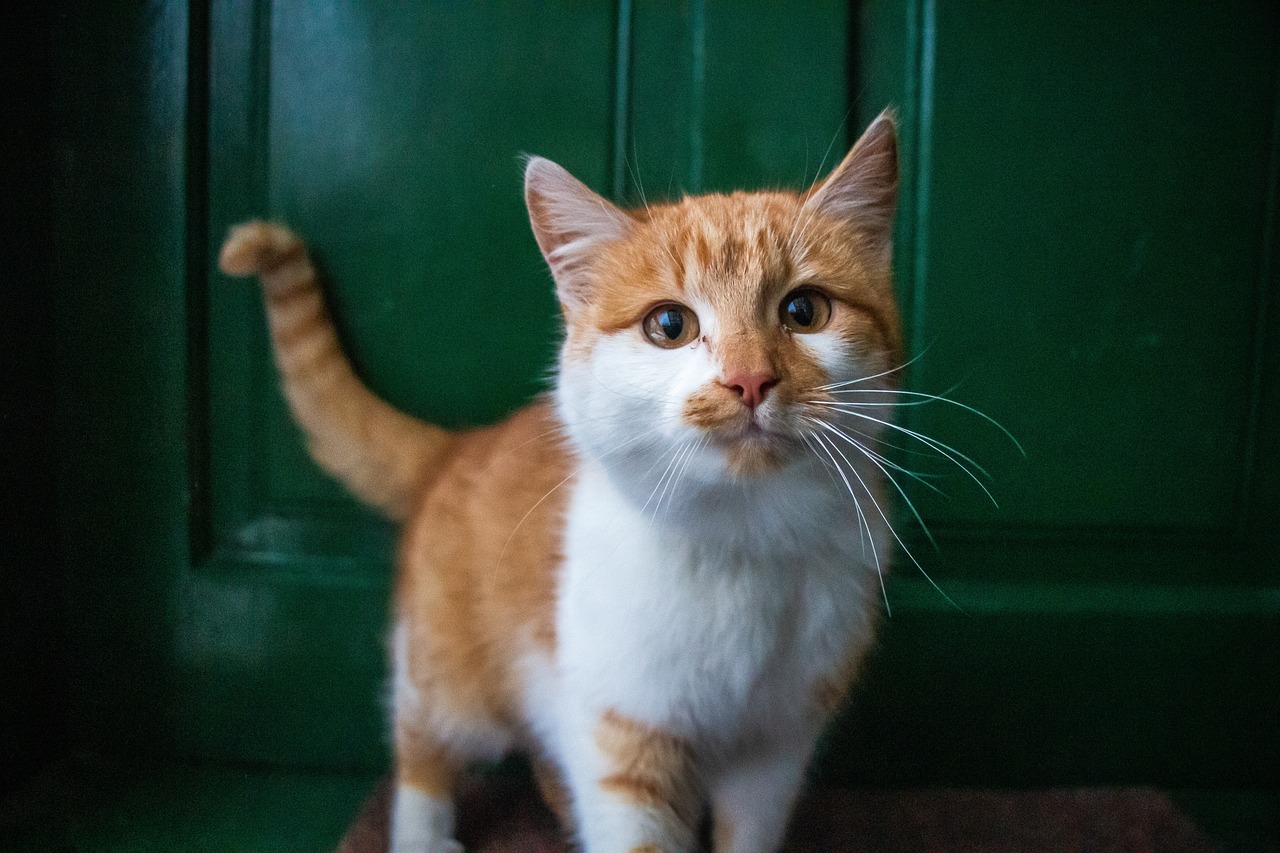
Temperament and Personality
The Ocicat is often described as a social butterfly of the feline world. With their charming personalities and friendly demeanor, these cats have a knack for making everyone around them feel special. They are not your typical aloof cats; instead, they thrive on interaction and companionship. Imagine coming home after a long day, and instead of hiding away, your Ocicat greets you at the door, ready to share in your adventures. This breed's affectionate nature makes them wonderful companions for families, singles, and seniors alike.
One of the standout features of the Ocicat is its playful spirit. These cats are full of energy and love to engage in various activities. Whether it’s chasing a feather toy or playing hide and seek with their favorite human, Ocicats are always up for some fun. Their playful antics can bring a smile to anyone's face, reminding us that life is too short not to enjoy every moment. It's not uncommon for an Ocicat to initiate a game, inviting you to join in on their playful escapades. This playful nature is not just entertaining; it also contributes to their overall health and well-being.
Ocicats are highly energetic and playful, often engaging in games and activities that stimulate their minds and bodies. Their playful demeanor helps keep them active and healthy throughout their lives. You might find them climbing on furniture, pouncing on unsuspecting toys, or even engaging in a game of fetch! This breed's enthusiasm for play can be likened to that of a child; they have boundless energy and a curiosity that keeps them exploring their surroundings. Owners often find that providing a variety of toys and interactive playtime can lead to a happy and fulfilled Ocicat.
When it comes to intelligence, Ocicats are among the brightest of their kind. These clever felines enjoy problem-solving activities, which can range from puzzle feeders to learning tricks. Their ability to learn and adapt is nothing short of impressive. You might even find yourself teaching your Ocicat to perform simple commands, turning them into a little showstopper in your living room! Their intelligence also means they require mental stimulation, so it's essential to keep their environment enriched with toys and challenges to prevent boredom.
Ocicats are known for their sociable nature, often seeking out human interaction and enjoying being part of family activities. They are not just pets; they are members of the family. These cats form strong bonds with their owners, often following them from room to room, eager to be involved in whatever is happening. Their affectionate behavior can manifest in various ways, from gentle headbutts to curling up in your lap while you watch TV. This need for companionship makes them great for households that appreciate a loving and interactive pet.
Another fantastic trait of the Ocicat is their ability to get along with other pets. Whether you have dogs, other cats, or even small animals, Ocicats typically adapt well to multi-pet households. Their friendly disposition allows them to coexist harmoniously with their furry companions. Just like a welcoming party host, they are often the first to approach new pets, eager to make friends. This adaptability makes them an excellent choice for families with existing pets, fostering a peaceful and enjoyable home environment.
Q: Are Ocicats good with children?
A: Yes! Ocicats are known for their friendly and playful nature, making them great companions for children. They enjoy interactive play, which can lead to a wonderful bond.
Q: How much exercise do Ocicats need?
A: Ocicats are energetic cats that require regular playtime to stay healthy and happy. Daily interactive play sessions are essential to meet their exercise needs.
Q: Do Ocicats shed a lot?
A: Ocicats have a short, dense coat that requires regular grooming. While they do shed, routine brushing can help minimize loose hair around the house.
Q: Can Ocicats be left alone for long periods?
A: Ocicats thrive on social interaction and may become bored or lonely if left alone for extended periods. It's best to have companionship or engaging activities available when you're away.
Playfulness
When it comes to the Ocicat, playfulness is not just a trait; it’s a way of life! These cats are bursting with energy and enthusiasm, turning every day into a new adventure. Imagine a small leopard dashing around your living room, leaping onto furniture, and engaging in spirited play. That's the Ocicat for you! Their playful nature is not merely about having fun; it’s essential for their physical and mental well-being.
One of the most delightful aspects of an Ocicat's playfulness is their love for interactive games. They thrive on activities that challenge their minds and bodies, such as chasing laser pointers, batting at feather toys, or even engaging in a game of fetch. Yes, you read that right! Many Ocicats can be trained to fetch, bringing back their favorite toy with a proud strut. This playful demeanor not only keeps them active but also strengthens the bond between the cat and its owner.
To keep your Ocicat entertained and stimulated, consider incorporating a variety of toys and activities into their daily routine. Some popular options include:
- Interactive Puzzle Toys: These toys challenge your cat to think and problem-solve, providing mental stimulation.
- Cat Trees: Climbing structures allow them to exercise their natural instincts to climb and explore.
- Feather Wands: Great for interactive play, these toys mimic the movements of birds, enticing your Ocicat to pounce and leap.
It's important to engage with your Ocicat regularly. They are social creatures that thrive on interaction. Setting aside time each day for playtime not only keeps them physically fit but also mentally sharp. Think of it as a workout session for both you and your furry friend! The joy and laughter they bring during play can turn an ordinary day into an extraordinary one.
So, if you’re considering bringing an Ocicat into your home, be prepared for a lively, engaging companion that will keep you on your toes. Their playful spirit is infectious, and you might find yourself joining in on their antics! Just remember, a tired Ocicat is a happy Ocicat, so keep those toys handy and get ready for some feline fun!
Here are some common questions about the playful nature of Ocicats:
- How much playtime does an Ocicat need? Ocicats require at least 30 minutes of active playtime each day to stay healthy and happy.
- Can I train my Ocicat to play fetch? Absolutely! Many Ocicats enjoy fetching and can be trained to do so with patience and positive reinforcement.
- What types of toys do Ocicats prefer? They tend to enjoy interactive toys that stimulate their hunting instincts, such as feather wands and laser pointers.
Intelligence
The Ocicat is not just a pretty face; it's also a brainy feline! These cats are known for their sharp intelligence and curious nature, making them one of the more engaging breeds to have around. Have you ever watched a cat solve a puzzle? It's like watching a little furry detective at work! Ocicats are particularly adept at problem-solving, which can be both entertaining and rewarding for their owners. They thrive on mental stimulation, so if you’re looking for a cat that can keep you on your toes, the Ocicat might just be your perfect match.
Training an Ocicat can be a delightful experience due to their eagerness to learn. They can be taught a variety of tricks, from simple commands like "sit" and "high five" to more complex activities like agility courses. Imagine impressing your friends with a cat that can navigate a mini obstacle course! This intelligence also means that Ocicats can become bored easily, so it’s essential to keep their environment enriched with toys and activities that challenge their minds.
To give you an idea of how intelligent these cats are, here are some key traits:
- Problem Solving: Ocicats can figure out how to open doors or cabinets. They often enjoy interactive toys that require them to think.
- Social Learning: They can learn from observing other pets, making them quick adapters in multi-pet households.
- Memory: Ocicats have excellent memories, allowing them to remember routines and even where you hide their favorite toys!
In conclusion, if you want a cat that not only looks stunning but also keeps your mind engaged, the Ocicat is a fantastic choice. Their intelligence is a significant part of their charm, and it makes for a rewarding relationship between the cat and its owner. Just remember, a bored Ocicat can lead to mischief, so be ready to keep those little brains busy!
Q: Are Ocicats easy to train?
A: Yes! Ocicats are quite intelligent and can learn various commands and tricks, especially if training is done with patience and positive reinforcement.
Q: Do Ocicats get along with other pets?
A: Absolutely! Their friendly nature makes them adaptable and sociable, allowing them to coexist harmoniously with other pets, including dogs.
Q: How much exercise do Ocicats need?
A: Ocicats are active and playful, requiring regular exercise through playtime and interactive toys to keep them physically and mentally stimulated.
Q: What are the grooming needs of an Ocicat?
A: They require regular brushing to maintain their coat and reduce shedding. Occasional baths may also be necessary to keep them clean.
Social Behavior
The Ocicat is not just a pretty face; its social behavior is one of its most endearing traits. These cats are known for their outgoing and friendly nature, which makes them wonderful companions for families and individuals alike. If you’re looking for a feline friend that loves to be around people, the Ocicat might just be the perfect match for you. They thrive on interaction and are often seen following their owners around the house, eager to be part of whatever activity is happening. It’s as if they have an innate desire to be included in family life, much like a loyal dog.
One of the most fascinating aspects of Ocicat behavior is their ability to bond closely with humans. They are affectionate and often seek out cuddles and attention, making them feel more like a member of the family than just a pet. This bond can be so strong that some Ocicats may even exhibit signs of separation anxiety when left alone for extended periods. To mitigate this, it’s essential for owners to provide plenty of mental and physical stimulation to keep their Ocicat entertained.
In addition to their love for human interaction, Ocicats are also quite sociable with other pets. They generally get along well with dogs and other cats, which can foster a harmonious multi-pet household. Their friendly disposition allows them to adapt easily to the presence of other animals. However, it’s important to introduce them properly and monitor their interactions, especially during the initial introductions. This helps ensure that everyone feels comfortable and safe in their shared environment.
To summarize the social behavior of Ocicats, here are some key points:
- Highly interactive: They seek out human company and enjoy being involved in family activities.
- Affectionate: Ocicats are known for their loving nature and may show signs of separation anxiety.
- Good with other pets: They typically get along well with dogs and other cats, promoting a peaceful home environment.
In essence, if you’re considering bringing an Ocicat into your life, be prepared for a cat that is not just a pet but a true companion. Their social behavior is one of the many reasons why they are adored by cat enthusiasts around the world.
- Do Ocicats require a lot of attention? Yes, they thrive on interaction and companionship, so they do best in homes where they receive plenty of attention.
- Can Ocicats live with other pets? Absolutely! They are generally friendly and can adapt well to living with other cats and even dogs.
- Are Ocicats prone to separation anxiety? Yes, due to their affectionate nature, they can experience separation anxiety if left alone for long periods.
Compatibility with Other Pets
When it comes to sharing your home with multiple pets, the Ocicat shines as a remarkably adaptable companion. These cats possess a friendly disposition that allows them to get along well with a variety of other animals. Whether you have dogs, other cats, or even small pets like rabbits, Ocicats are known to integrate seamlessly into multi-pet households. Their sociable nature encourages them to seek out interactions, making them less likely to engage in territorial disputes or aggressive behavior.
One of the most appealing traits of the Ocicat is its innate curiosity. This breed often exhibits a playful demeanor, which can foster friendships with other pets. For instance, an Ocicat might enjoy chasing a dog’s tail or engaging in a friendly game of tag with another cat. Their playful antics can lighten the mood in any household, bringing joy to both their human companions and their fellow pets.
However, it's important to introduce new pets gradually to ensure a harmonious environment. Here are a few tips to consider when introducing an Ocicat to other pets:
- Slow Introductions: Allow your Ocicat to familiarize itself with the new pet's scent before any face-to-face meetings.
- Supervised Interactions: Initially, supervise all interactions to prevent any misunderstandings or aggressive behavior.
- Positive Reinforcement: Reward both pets with treats and praise when they exhibit calm and friendly behavior towards each other.
These steps can help pave the way for a peaceful coexistence. Moreover, Ocicats are known to be quite affectionate and can form strong bonds not just with their human families but also with their furry companions. Their friendly nature makes them ideal for families with children and other pets, as they are generally tolerant and easygoing.
In conclusion, if you’re considering adding an Ocicat to your family, rest assured that this breed is likely to be a wonderful addition to a multi-pet household. Their charming personality and playful spirit can create a lively atmosphere, turning your home into a joyful haven for all its inhabitants.
Q1: Do Ocicats get along with dogs?
A1: Yes, Ocicats typically get along well with dogs, especially if they are introduced properly and gradually.
Q2: Can Ocicats live with other cats?
A2: Absolutely! Ocicats are known for their sociable nature and can thrive in homes with other cats.
Q3: What should I do if my Ocicat doesn't get along with my other pets?
A3: If you encounter issues, consider re-evaluating introductions, providing separate spaces, and consulting with a veterinarian or animal behaviorist for advice.
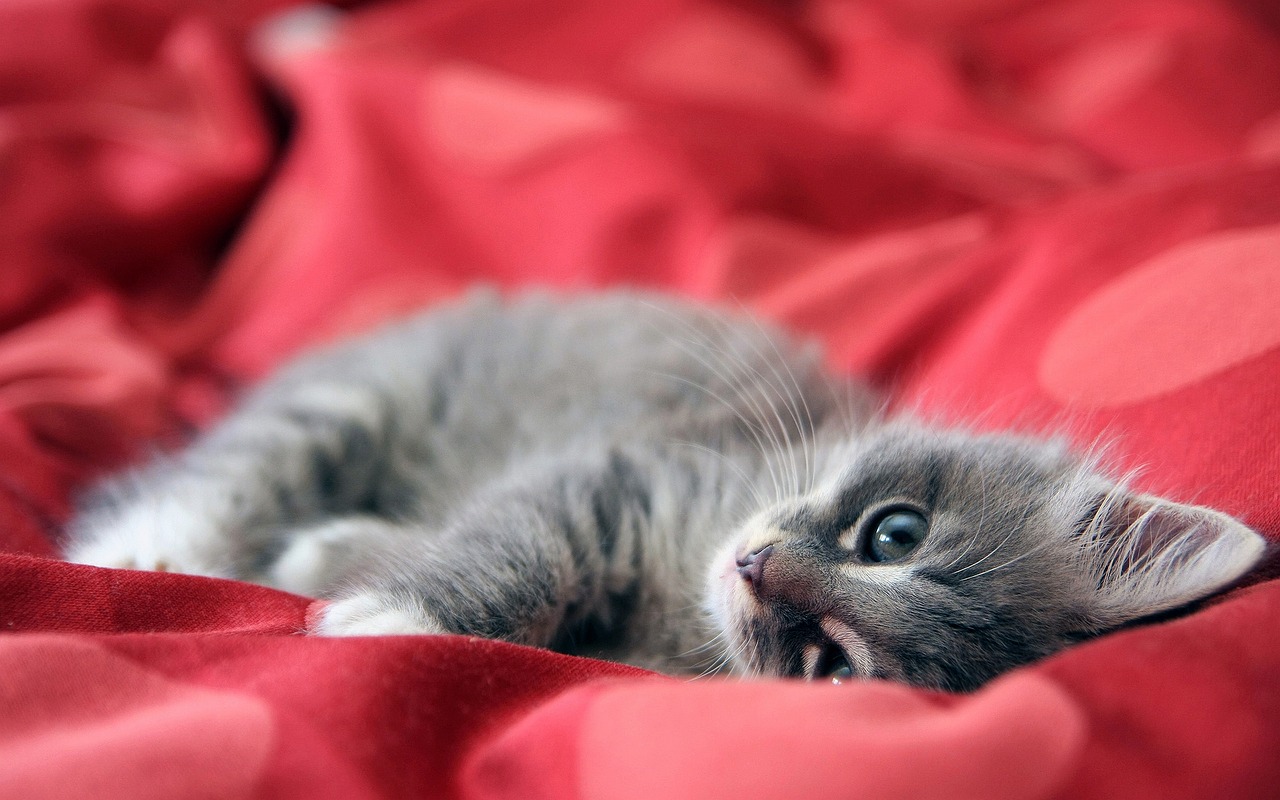
Health Considerations
This article explores the distinctive characteristics of the Ocicat breed, including its striking appearance, playful personality, and unique history, providing insights for potential owners and cat enthusiasts alike.
The Ocicat is known for its wild appearance, resembling a small leopard. Its striking coat patterns and muscular build make it a visually captivating breed that stands out among domestic cats.
Ocicats are renowned for their friendly and outgoing nature. They are social cats that thrive on interaction with humans and other pets, making them excellent companions for families and individuals alike.
These cats are highly energetic and playful, often engaging in games and activities that stimulate their minds and bodies. Their playful demeanor helps keep them active and healthy throughout their lives.
Ocicats are intelligent and curious creatures. They enjoy problem-solving activities and can be trained to perform tricks, making them not only entertaining but also mentally stimulating companions.
Their sociable nature means that Ocicats often seek out human interaction and enjoy being part of family activities. They are known to bond closely with their owners and can be quite affectionate.
Ocicats tend to get along well with other pets, including dogs and other cats. Their friendly disposition allows them to adapt to multi-pet households, fostering a harmonious environment.
While generally healthy, Ocicats are prone to certain genetic conditions. Regular veterinary check-ups and a balanced diet are essential to maintain their well-being and longevity. It's crucial for potential owners to be aware of these health considerations, as they can impact the quality of life for their furry friends. Understanding the typical lifespan of an Ocicat, which averages around 12 to 15 years, can help owners plan for their care and ensure they provide the best possible environment.
Some common health issues that Ocicats may face include:
- Hip Dysplasia: A condition that affects the hip joint, leading to pain and mobility issues.
- Hypertrophic Cardiomyopathy (HCM): A heart condition that can lead to heart failure if not monitored and managed.
- Obesity: Due to their playful nature, it's essential to monitor their diet to prevent excessive weight gain.
Being proactive about health can significantly enhance the life of an Ocicat. Owners should prioritize routine veterinary visits, which can help in early detection of any potential problems. Additionally, providing a balanced diet tailored to the cat's age and activity level is vital for maintaining their health.
Understanding the common health issues associated with Ocicats can help owners take proactive measures. Conditions such as hip dysplasia and certain heart diseases are important to monitor. Being aware of the signs of these conditions can make a significant difference in your cat’s health outcomes. For example, if your Ocicat shows signs of lethargy, difficulty in movement, or unusual breathing patterns, it’s best to consult a veterinarian promptly.
Routine veterinary visits, vaccinations, and a proper diet can significantly enhance the health of an Ocicat. Owners should prioritize preventive care to ensure their feline companions live long, healthy lives. Regular check-ups can help catch any early signs of health issues, allowing for timely intervention. Additionally, vaccinations are crucial for protecting Ocicats from common diseases, while a balanced diet rich in nutrients supports overall health and vitality.
Ocicats require regular grooming to maintain their beautiful coats. Understanding their grooming needs can help owners keep their cats looking and feeling their best while also promoting skin health.
Regular brushing helps reduce shedding and matting, ensuring the Ocicat's coat remains sleek and shiny. The right tools and techniques can make grooming a pleasant experience for both cat and owner.
Occasional baths may be necessary to keep the Ocicat clean and free of allergens. Learning proper bathing techniques can help owners maintain their cat's hygiene without causing stress.
- What is the lifespan of an Ocicat? Ocicats typically live between 12 to 15 years with proper care.
- Do Ocicats require a lot of grooming? While they have short coats, regular brushing is recommended to keep them looking their best.
- Are Ocicats good with children? Yes, their friendly nature makes them great companions for families with children.
- What should I feed my Ocicat? A balanced diet rich in protein and essential nutrients is crucial for their health.
Common Health Issues
The Ocicat, while generally a healthy breed, is not without its potential health concerns. Understanding these common health issues is crucial for any prospective or current owner. Just like how we pay attention to our own health, keeping an eye on our feline friends can lead to early detection and treatment of any problems. One of the most significant concerns for Ocicats is hip dysplasia. This condition occurs when the hip joint doesn't fit snugly into the hip socket, which can lead to arthritis or other joint problems as the cat ages. It's important to recognize the signs, which may include difficulty in movement or a reluctance to jump.
Another condition to be aware of is hypertrophic cardiomyopathy (HCM), a genetic heart disease that can affect many cat breeds, including Ocicats. This disease causes the heart muscle to thicken, potentially leading to heart failure. Regular veterinary check-ups can help monitor heart health and catch any issues early on. Owners should be vigilant for symptoms like lethargy, difficulty breathing, or sudden weight loss, as these can indicate a serious problem.
Additionally, Ocicats may be prone to certain skin conditions, especially if they have a history of allergies. These can manifest as itching, redness, or hair loss. Regular grooming and attention to their diet can help mitigate these issues, as a healthy coat often reflects a healthy cat. It's also worth noting that some Ocicats may develop diabetes later in life, particularly if they are overweight. Maintaining a balanced diet and ensuring they get enough exercise is essential.
In summary, while Ocicats are generally robust, being aware of these common health issues can empower owners to provide the best care possible. Regular veterinary visits, a healthy diet, and attentive observation of any behavioral changes can significantly enhance the quality of life for these beautiful cats. Remember, a proactive approach can make all the difference in keeping your Ocicat happy and healthy!
- What is the average lifespan of an Ocicat? Ocicats typically live between 12 to 15 years, but with proper care, they can live even longer.
- Do Ocicats require a lot of exercise? Yes, Ocicats are energetic and playful, needing regular playtime and mental stimulation to stay healthy.
- Are Ocicats good with children? Absolutely! Their friendly nature makes them great companions for kids.
- How often should I take my Ocicat to the vet? Regular check-ups at least once a year are recommended to monitor their health.
Preventive Care
When it comes to ensuring that your Ocicat lives a long and healthy life, is paramount. Just like you wouldn't skip your own health check-ups, your feline friend deserves the same level of attention. Regular veterinary visits are essential for monitoring their health, keeping vaccinations up to date, and catching any potential issues before they become serious problems. Think of these visits as a routine pit stop for your cat; they help ensure that everything is running smoothly under the hood.
In addition to veterinary check-ups, another crucial aspect of preventive care is maintaining a balanced diet. Feeding your Ocicat high-quality cat food that meets their nutritional needs can significantly impact their overall health. This breed, with its active lifestyle, requires a diet rich in protein and essential nutrients. You might want to consult with your veterinarian to determine the best food options tailored specifically for your Ocicat's age, weight, and activity level.
Moreover, regular dental care is often overlooked but is incredibly important. Just like humans, cats can suffer from dental issues that can lead to more severe health problems if not addressed. Brushing your Ocicat's teeth regularly or providing dental treats can help maintain their oral hygiene. It's a simple step that can make a world of difference in their health.
Another key factor in preventive care is keeping your Ocicat mentally and physically stimulated. These intelligent creatures thrive on engagement, so providing them with toys, scratching posts, and interactive playtime can help prevent behavioral issues and keep them happy. A bored Ocicat can become destructive, so think of playtime as a vital part of their health regimen.
Lastly, it's essential to monitor your Ocicat's weight. Obesity can lead to a slew of health issues, including diabetes and joint problems. Regular exercise and a proper diet will help maintain a healthy weight. If you notice your cat gaining weight, consider adjusting their food portions or increasing playtime. Remember, a healthy Ocicat is a happy Ocicat!
In summary, preventive care for your Ocicat involves:
- Regular veterinary check-ups
- A balanced diet rich in nutrients
- Routine dental care
- Mental and physical stimulation through play
- Monitoring their weight to prevent obesity
By taking these proactive steps, you can ensure that your Ocicat remains a vibrant and cherished member of your family for many years to come.
Q: How often should I take my Ocicat to the vet?
A: It's recommended to take your Ocicat for a check-up at least once a year, but more frequent visits may be necessary for older cats or those with health issues.
Q: What should I feed my Ocicat?
A: A high-quality, protein-rich cat food is ideal. Consult your veterinarian for specific recommendations based on your cat's age and health.
Q: How can I keep my Ocicat entertained?
A: Provide a variety of toys, engage in interactive play, and consider puzzle feeders to stimulate their minds and keep them active.
Q: Do Ocicats require special grooming?
A: While they have a short coat, regular brushing is beneficial to reduce shedding and maintain coat health.
Q: Are Ocicats prone to any health issues?
A: Yes, they can be susceptible to certain genetic conditions such as hip dysplasia and heart diseases, so regular check-ups are crucial.
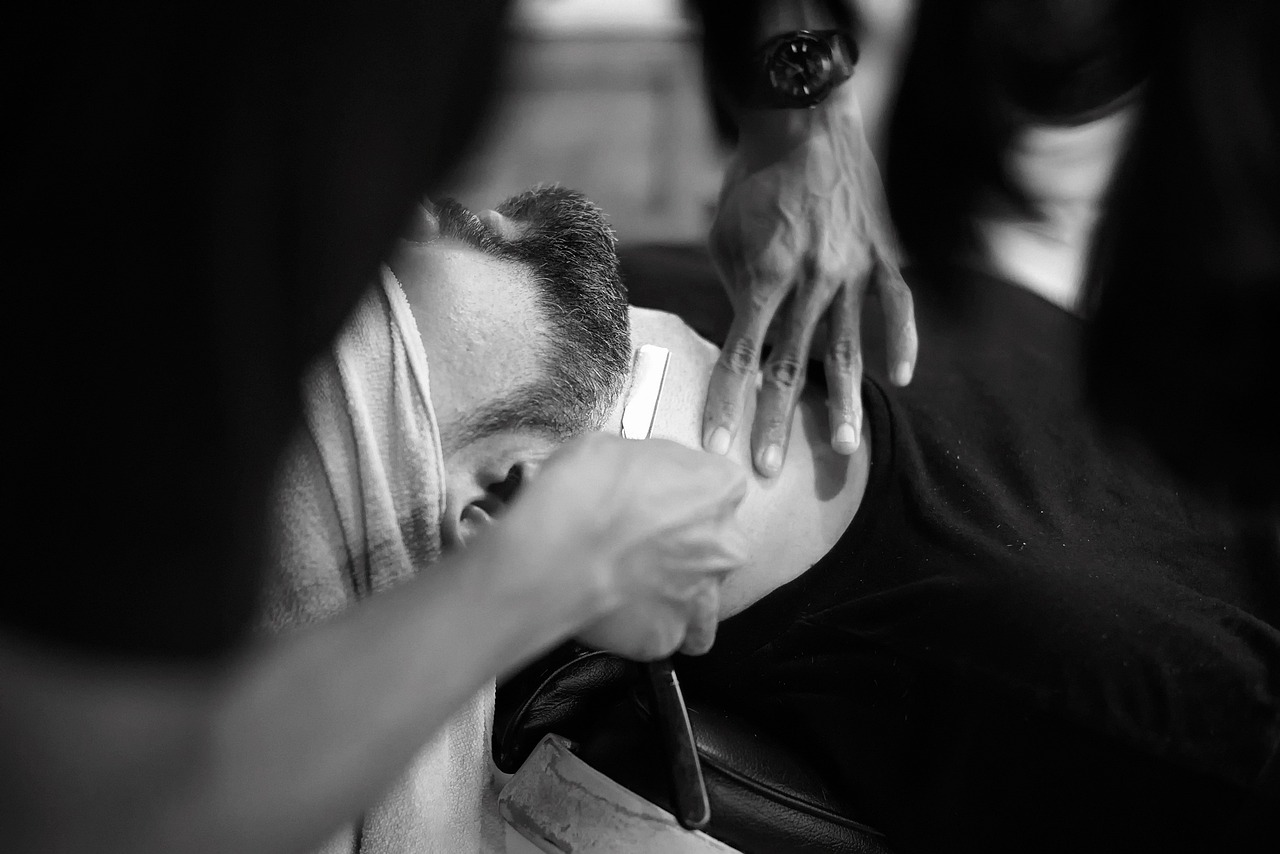
Grooming Needs
When it comes to grooming your Ocicat, it's not just about keeping them looking fabulous—it's also about their overall health and well-being. These stunning cats possess a short, dense coat that requires regular attention to maintain its luster and prevent any skin issues. Grooming can be a bonding experience, transforming a mundane task into a delightful ritual between you and your furry friend. So, how often should you groom your Ocicat? Ideally, a weekly brushing session should do the trick, but if your cat enjoys it, you can certainly do it more often!
One of the key aspects of grooming your Ocicat is understanding the right techniques and tools to use. A slicker brush or a rubber grooming glove can work wonders in removing loose hair and dirt while also stimulating their skin, promoting healthy blood circulation. It’s important to be gentle, as Ocicats can be sensitive. Always keep an eye out for any signs of discomfort, and adjust your method accordingly. Regular brushing not only reduces shedding but also minimizes the chances of matting, which can be a real nuisance.
Another important consideration is bathing. While Ocicats are generally good at keeping themselves clean, occasional baths can help eliminate allergens and keep their coat in pristine condition. It’s best to use a cat-specific shampoo that won’t irritate their skin. When bathing your Ocicat, ensure the water temperature is lukewarm and the environment is calm to avoid stressing them out. A good tip is to have everything ready before you start—shampoo, towels, and a non-slip mat in the tub will make the process smoother.
Here’s a quick summary of grooming needs for your Ocicat:
| Grooming Task | Frequency | Tools Needed |
|---|---|---|
| Brushing | Weekly | Slicker brush, rubber grooming glove |
| Bathing | As needed | Cat shampoo, towels, non-slip mat |
In addition to brushing and bathing, don’t forget about other grooming needs such as nail trimming and ear cleaning. Ocicats, like all cats, can benefit from regular nail trims to keep their claws from becoming overgrown. Aim for a trim every couple of weeks, but be careful to avoid the quick, which is the sensitive part of the nail. For ear cleaning, check their ears weekly for any dirt or wax build-up. A gentle wipe with a damp cloth or a vet-recommended ear cleaner should suffice.
By incorporating these grooming practices into your routine, you can ensure that your Ocicat remains healthy and happy. Remember, grooming is not just about appearance; it's a vital part of their care that strengthens your bond and contributes to their overall quality of life. So grab those grooming tools, put on some relaxing music, and enjoy the precious moments spent with your delightful feline companion!
1. How often should I groom my Ocicat?
It's recommended to brush your Ocicat at least once a week to keep their coat healthy and reduce shedding.
2. Can I use human shampoo on my Ocicat?
No, it's best to use a cat-specific shampoo to avoid skin irritation.
3. Do Ocicats require professional grooming?
Generally, no. Regular home grooming is usually sufficient, but if you feel overwhelmed, a professional groomer can help.
4. How can I make grooming more enjoyable for my Ocicat?
Start slowly, use treats, and create a calm environment to help your Ocicat associate grooming with positive experiences.
Brushing Techniques
Brushing your Ocicat is not just a chore; it’s an opportunity to bond with your feline friend while keeping their stunning coat in top-notch condition. The Ocicat's unique coat, which resembles that of a wild leopard, requires regular grooming to maintain its shine and health. To start, it’s essential to choose the right tools. A slicker brush is perfect for removing loose fur and preventing matting, while a bristle brush can help distribute natural oils, giving your cat’s coat that beautiful sheen. Aim to brush your Ocicat at least once a week, but if they enjoy it, feel free to make it a daily routine!
When brushing, always be gentle and patient. Start at the head and work your way down to the tail, using long, smooth strokes. This not only helps to remove any dirt or loose hair but also gives your cat a soothing experience. If your Ocicat has any particularly matted areas, take your time and use the slicker brush carefully to detangle without causing discomfort. Remember, grooming should be a positive experience; if your cat seems agitated, take a break and try again later.
Here’s a quick table summarizing the essential tools and techniques for brushing your Ocicat:
| Tool | Purpose | Frequency |
|---|---|---|
| Slicker Brush | Removes loose fur and prevents matting | Weekly |
| Bristle Brush | Distributes natural oils for a shiny coat | Weekly |
| Comb | Detangles fur and checks for parasites | As needed |
Additionally, consider rewarding your Ocicat with treats or extra playtime after grooming sessions. This creates a positive association with brushing, making it easier for both of you in the long run. With consistent care and attention, your Ocicat will not only look fabulous but will also enjoy the grooming process, strengthening your bond and ensuring their coat remains a showstopper!
Q: How often should I brush my Ocicat?
A: It’s recommended to brush your Ocicat at least once a week, but daily brushing can help keep their coat even more healthy and shiny.
Q: What if my Ocicat doesn’t like being brushed?
A: Start slowly and make the experience positive. Use treats and gentle strokes, and if they seem uncomfortable, take breaks and try again later.
Q: Can I bathe my Ocicat?
A: Yes, occasional baths can be beneficial for their hygiene, but make sure to use cat-specific shampoos and follow proper bathing techniques to minimize stress.
Bathing and Care
Bathing your Ocicat is not just about keeping them clean; it's a vital part of their overall care routine that can enhance their health and happiness. While Ocicats are known for their low-maintenance coats, occasional baths can help remove dirt, allergens, and excess oils that may accumulate over time. It's important to choose the right time for a bath—ideally when your cat is calm and relaxed. This ensures a smoother experience for both of you.
When preparing for bath time, gather all necessary supplies in advance. You’ll need a gentle cat shampoo, a non-slip mat for the tub or sink, and towels for drying. Make sure the water is lukewarm, as extreme temperatures can be uncomfortable for your furry friend. Start by wetting your Ocicat gradually, allowing them to acclimate to the water. Use a cup or a gentle sprayer to avoid startling them.
During the bath, be sure to avoid getting water in their ears and eyes. A gentle lather of shampoo will suffice; there's no need for vigorous scrubbing. Rinse thoroughly to ensure no residue is left behind, as leftover shampoo can irritate their skin. After the bath, wrap your Ocicat in a towel and gently dry them off. Some cats might enjoy the warmth of a blow dryer, but always use it on a low setting and keep it at a safe distance to prevent overheating.
In addition to bathing, regular grooming is essential to maintain your Ocicat's coat health. Brushing helps reduce shedding and prevents matting, keeping their fur sleek and shiny. A quality grooming tool can make this task much easier and more enjoyable for both you and your cat. Aim for a brushing session at least once a week, and more frequently during shedding seasons.
Overall, the key to successful bathing and care lies in patience and gentleness. Your Ocicat may not initially love bath time, but with consistent positive experiences, they can learn to tolerate it. Remember, this is not just about cleanliness; it's an opportunity to bond with your feline friend and ensure they remain healthy and happy.
- How often should I bathe my Ocicat? Generally, bathing once every few months is sufficient unless they get particularly dirty.
- What type of shampoo is best for Ocicats? Use a mild, cat-specific shampoo to avoid skin irritation.
- Can I use human shampoo on my Ocicat? No, human shampoos can be too harsh for cats’ sensitive skin.
- Do I need to trim my Ocicat's nails? Yes, regular nail trimming is important for their health and comfort.
Frequently Asked Questions
- What does an Ocicat look like?
The Ocicat has a striking appearance, resembling a small leopard with its wild-looking coat patterns and muscular build. Their fur is short, dense, and comes in various colors, making them visually captivating and unique among domestic cats.
- Are Ocicats friendly with children and other pets?
Absolutely! Ocicats are known for their friendly and outgoing nature. They thrive on social interaction, making them great companions for families and individuals. Their sociable demeanor allows them to get along well with children and other pets, including dogs.
- How active are Ocicats?
These cats are highly energetic and playful, often engaging in games that stimulate their minds and bodies. Their playful nature keeps them active and healthy, so be prepared for lots of fun and games!
- Can Ocicats be trained?
Yes! Ocicats are intelligent and curious, which makes them quite trainable. They enjoy problem-solving activities and can learn tricks, providing both entertainment and mental stimulation for their owners.
- What health issues should I be aware of with Ocicats?
While generally healthy, Ocicats can be prone to certain genetic conditions such as hip dysplasia and certain heart diseases. Regular veterinary check-ups and a balanced diet are essential for maintaining their health and well-being.
- How often should I groom my Ocicat?
Ocicats require regular grooming to keep their beautiful coats in top shape. Brushing them a few times a week can help reduce shedding and matting, ensuring their fur remains sleek and shiny.
- Do Ocicats need baths?
Occasional baths may be necessary to keep your Ocicat clean and free of allergens. Learning proper bathing techniques can help maintain their hygiene without causing stress to your furry friend.

